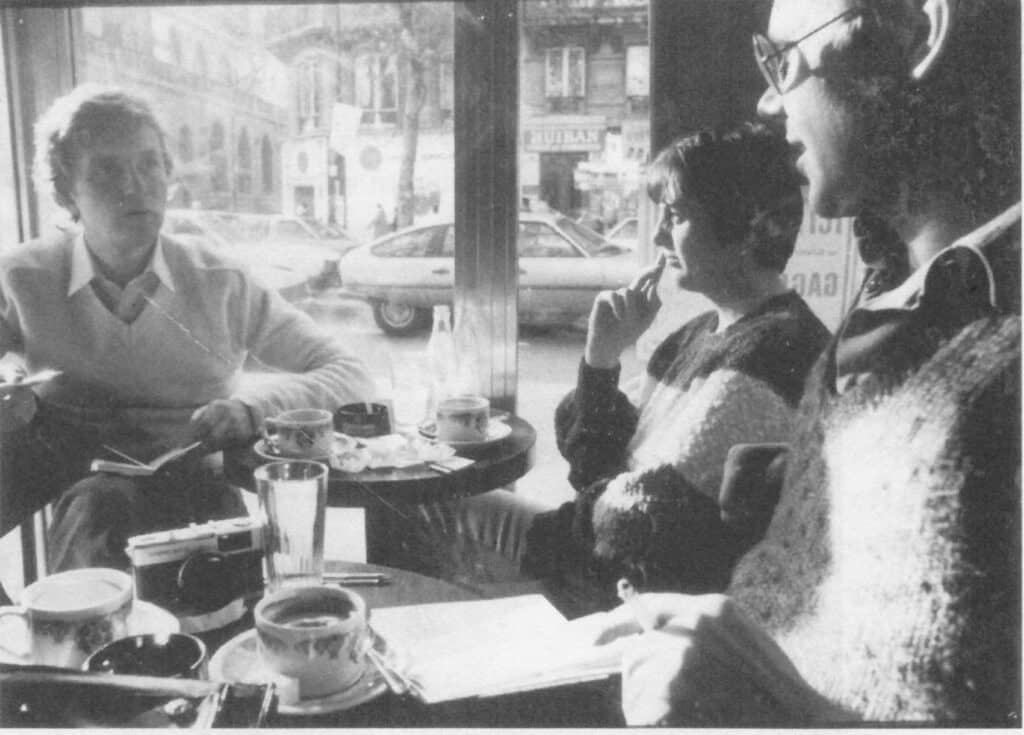Preface
The first draft of this article was finished in May 2008. It was written by Jan Weimann, Niels Jørgensen, and Torkil Lauesen, who have been called the “inner circle” of the Blekingegade Group. All three of us were sentenced to ten years in prison for criminal activities motivated by supporting Third World liberation movements.
In September 2008, Niels Jørgensen died after a few days of sickness. This was a huge personal loss for us. It also made it difficult to finish the article. Yet, we decided to do so nonetheless, not least because Niels would have wanted us to.
Niels Jørgensen remains listed as a coauthor because the article’s contents have not changed since his passing and because he clearly left his mark on the text.
Torkil Lauesen and Jan Weimann
Copenhagen, January 20, 2009

The Article’s Intention
For the past few years, there has been extensive media coverage of the so-called Blekingegade Gang. Especially the journalist Peter Øvig Knudsen (PØK) and the retired police investigator Jørn Moos have made regular media appearances as a result of their books about the Blekingegade Group. In early 2009, both the documentary film Blekingegadebanden and the play Blekingegade premiered. A TV series produced by Zentropa is on its way. [1]
PØK’s two-volume work is widely regarded as the truth about the Blekingegade Group. Together with Moos’s books, it might well be considered the authoritative source on the subject in the future. We find this unsettling. The current media coverage of the Blekingegade Group is full of distortions and wrong assumptions. The aforementioned publications have significantly contributed to this. At least in part, this article is a response to them.
The name “Blekingegade Gang” is a label created by the media. We saw ourselves first and foremost as a political group. All of us have been politically interested and organized since a young age. In the beginning of the 1970s, we became members of the Kommunistisk Arbejdskreds, KAK. The original KAK dissolved in 1978. Afterward, the three of us were cofounders of Manifest – Kommunistisk Arbejdsgruppe, M – KA.
In this text, we want to outline the political practice of both organizations. A part of this practice was to secure material support for Third World liberation movements by illegal means. The practice did not involve all of the organizations’ members. It was pursued by a “subgroup,” whose membership fluctuated and who will be referred to here as the “Blekingegade Group.”
The intention of the article is therefore twofold:
1.We feel a need to outline our political project.
In the 1970s and ’80s, when we were politically active, the world looked very different from the way it does today. This is why the article includes a description of the era. How did we see the world when we developed our political project? What were our positions and theories? Who were we inspired by? Who were our partners and allies? Why did we choose to act the way we did?
2. We want to correct wrong assumptions about our theory and practice.
We do not intend to systematically address all the wrong assumptions that have been made about our political perspectives, the people and organizations we worked with, and our legal as well as illegal activities. But we want to address some of the most important ones and some of the most common misunderstandings and misrepresentations.
Øvig’s Sources and Methods
PØK’s primary sources are police reports. The people he talked to were mostly law enforcement agents. When he was interviewed by dk4 in the old Horsens State Prison for the program Litteratursiden [The Literary Page], [2] PØK confirmed that he went through the police files under the guidance of police officers. Apparently, the files would have been impossible to make sense of otherwise. However, it seems to us that he never even bothered to double-check on most of the information he received. He appears to have taken most of the police’s guesswork for facts. PØK also admitted in the program that the suspense factor was very important for his book. This obviously compromised the documentary quality. It is therefore not surprising that PØK arrived at plenty of wrong conclusions. We will address the most problematic ones on the following pages.
We ourselves want to focus on politics rather than crime. After all, the Blekingegade case was about politics. We also look at what happened in the context of its time, while PØK’s approach is characterized by the current obsession with “terrorism.”
Both PØK’s research and his political knowledge have clear limitations. It is clear, for example, that he has not even looked at some of the most crucial material, such as the journals, pamphlets, and books published by KAK and M-KA. His knowledge of liberation movements hardly goes beyond that of glossy magazine articles. Proper research would have provided answers to many of his questions and prevented many of his false conclusions. The most serious problem, however, is that it is impossible for his readers to distinguish fact from fiction. PØK’s work lacks references for almost any of the claims he makes. Readers can therefore not establish the credibility of his book’s contents.
Noter
[1] Zentropa is a Danish film company founded in 1992 by Lars von Trier and Peter Aalbæk Jensen. The TV series, entitled Blekingegade, aired in late 2009 and early 2010. Regarding the documentary film and the play, see the introduction. – Ed.
[2] The Danish television channel dk4 was launched in 1994. – Ed.
























